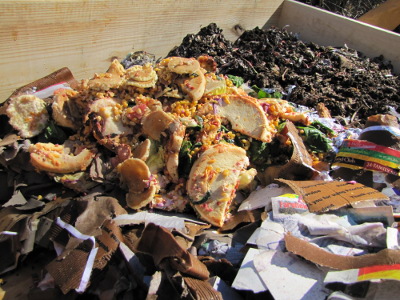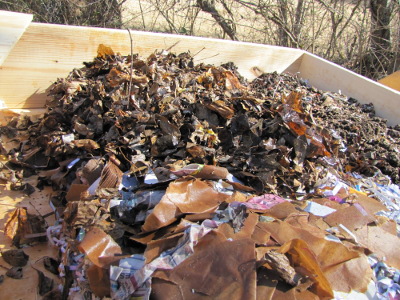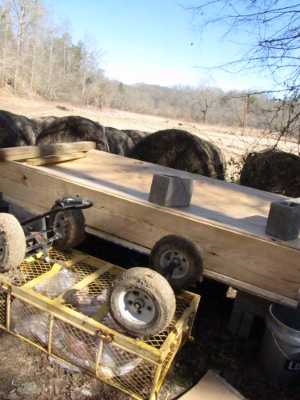
Feeding the worms
 Even though the worm bin
needs a bit more work before it's completely critter-proof, I couldn't
resist putting in the first round of food scraps Saturday.
Partly, the impetus was impatience on my part, but I was also thinking
about worm biology. Although we think that worms eat our garbage
(and there is, in fact, a book with that name), worms really eat the
microorganisms that eat our garbage. Our worms can't do much with
food scraps until the waste material has been composting for about a
week, so I figured I'd better get that process started.
Even though the worm bin
needs a bit more work before it's completely critter-proof, I couldn't
resist putting in the first round of food scraps Saturday.
Partly, the impetus was impatience on my part, but I was also thinking
about worm biology. Although we think that worms eat our garbage
(and there is, in fact, a book with that name), worms really eat the
microorganisms that eat our garbage. Our worms can't do much with
food scraps until the waste material has been composting for about a
week, so I figured I'd better get that process started.
 We
pick up food scraps twice a week, but right now I'm keeping the worms
on a once a week feeding schedule. For our estimated 9 pounds of
worms, I figure they can handle 30 to 60 pounds of food scraps per week
(plus however much bedding I mix in to keep the bin in
good shape.) Since the weather is still on the cool side and the
worms are just getting used to their new home, I added 37 pounds for
their first week's diet. In a couple of weeks, I should be able
to poke through this week's compost zone and see whether the worms have
done their job, which will give me an idea about whether I should slow
down or speed up
We
pick up food scraps twice a week, but right now I'm keeping the worms
on a once a week feeding schedule. For our estimated 9 pounds of
worms, I figure they can handle 30 to 60 pounds of food scraps per week
(plus however much bedding I mix in to keep the bin in
good shape.) Since the weather is still on the cool side and the
worms are just getting used to their new home, I added 37 pounds for
their first week's diet. In a couple of weeks, I should be able
to poke through this week's compost zone and see whether the worms have
done their job, which will give me an idea about whether I should slow
down or speed up  their food intake. I
have high hopes that within a couple of months, the worm population
will have expanded far enough that we can put all of the school's food
scraps in without worrying about overloading the bin.
their food intake. I
have high hopes that within a couple of months, the worm population
will have expanded far enough that we can put all of the school's food
scraps in without worrying about overloading the bin.
As a side note, you
might notice the hamburgers poking out of the top of the mass of food
scraps in the first photo. Most websites will tell you to steer
clear of breads, meats, and oils in your worm bin, mostly because they
attract scavenging animals and can smell. However, I suspect that
the large
size of our worm bin
(and its distance from habitation) will mitigate these issues and allow
us to mix in all types of waste. I'll let you know if we have any
problems.
| This post is part of our Hands-on Wormkeeping lunchtime series.
Read all of the entries: |
Want more in-depth information? Browse through our books.
Or explore more posts by date or by subject.
About us: Anna Hess and Mark Hamilton spent over a decade living self-sufficiently in the mountains of Virginia before moving north to start over from scratch in the foothills of Ohio. They've experimented with permaculture, no-till gardening, trailersteading, home-based microbusinesses and much more, writing about their adventures in both blogs and books.
Want to be notified when new comments are posted on this page? Click on the RSS button after you add a comment to subscribe to the comment feed, or simply check the box beside "email replies to me" while writing your comment.

Some things are avoided from being added to bins due to the contents of the materials or the effect they have. Breads can sometimes cause heat spikes, citrus peels contain limonene (limonene is a natural insecticide, used as a solvent, and is a skin irritant).. so once it is oxidized it's potency is reduced and then they are able to process it.
Bedding... bedding is yet another food source. The materials used generally break down more slowly but they as well decompose and provide food sources for the worms.
Caution is used when offering food because aside from attracting things you don't want (ants, scavengers, etc.).. you run the risk of the contents hot composting. Improper hot composting puts out higher levels of carbon dioxide, ammonia, nitrous oxide.. or if too wet methane.
I'm not trying to be discouraging.. just one of the biggest pitfalls in vermicomposting is overfeeding (and not enough airflow... or too wet).
If you are looking to breakdown meats, grease, oils, dairy, etc. the black soldier fly maggot would make quick work of it. The worms do feed off of the microbes decomposing the materials.. but different microbes have different diets.
If you are trying to process too much materials.. maybe consider hot composting.. and like in nature let the worms finish off the compost.
Best of luck to you.
Thanks for your feedback. We're working with scraps from a school, so we can't sort anything out without a lot of trouble. The author of Worm Cafe, which we based our system on, noted that nothing really causes too much trouble in large-scale worm bins like ours.
As long as you don't overfeed, of course! We're being very careful to weight the food and match it up to the weight of worms we have available. If anything, I'm going a little overboard on the bedding to make up for mixing so many odd things in there together, and that should keep the bin from having any real trouble. No signs of smell so far, which I take to be a good sign.
Since we weren't able to buy enough worms to use all of the food scraps right away, we're composting the rest in a traditional compost bin. And we do have black soldier flies on the horizon, although you really can't start those at this time of year since the adults don't start flying until April or May.
I've seen a few sewage treatment facilities using poplar wood chips (from their own grove of trees) for treating waste sludge via composting. It's a hot process and they use the chips because they do not break down very fast so may be reused at least three times and as many as five times before they are no longer adequate to the job. They are used to keep the piles aerated and eventually absorb and break down from the nutrients. They let the piles run hot to the point of being uncomfortable to stand near or breath the gases generated. Once out of range you can't tell it's there except for some vapor that escapes the building in winter. The farmers and gardeners in the area love the stuff and make the sewer plants some needed extra revenue even though the compost is fairly cheap--just not free. If you decided to use chips you could reuse them perhaps several times depending on how long you keep them in individual heaps. Just a thought for the future.